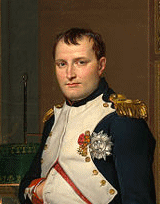
1795 General Napoleon Bonaparte first rises to national prominence being named to defend the French National Convention against armed counter-revolutionary rioters threatening the three year old revolutionary government.
1795 Napoleon Bonaparte first rises to national prominence with a "Whiff of Grapeshot", using cannon to suppress armed counter-revolutionary rioters threatening the French Legislature (National Convention).
1796 Napoléon Bonaparte marries his first wife, Joséphine de Beauharnais.
1796 The Armistice of Cherasco is signed by Napoleon Bonaparte and Vittorio Amedeo III, the King of Sardinia, expanding French territory along the Mediterranean coast.
1796 First Coalition: Napoleon I of France wins a decisive victory against Austrian forces at Lodi bridge over the Adda River in Italy. The Austrians lose some 2,000 men.
1796 First Coalition: Napoleon enters Milan in triumph.
1797 First Coalition: Napoleon I of France conquers Venice.
1799 Napoleon Bonaparte captures Jaffa in Palestine and his troops proceed to kill more than 2,000 Albanian captives.
1799 At Aboukir in Egypt, Napoleon I of France defeats 10,000 Ottomans under Mustafa Pasha.
1799 Napoleon leaves Egypt for France en route to seize power.
1799 Napoleon Bonaparte leads the Coup d'état of 18 Brumaire ending the Directory government, and becoming one of its three Consuls (Consulate Government).
1800 The French Army of First Consul Napoleon Bonaparte defeats the Austrians at the Battle of Marengo in Northern Italy and re-conquers Italy.
1802 Napoleon Bonaparte signs a general amnesty to allow all but about one thousand of the most notorious émigrés of the French Revolution to return to France, as part of a reconciliary gesture with the factions of the Ancien Regime and to eventually consolidate his own rule.
1802 Napoleon Bonaparte founds the Légion d'Honneur.
1802 By the Law of 20 May 1802, Napoleon Bonaparte reinstates slavery in the French colonies, revoking its abolition in the French Revolution
1804 Napoleon Bonaparte is proclaimed Emperor of the French by the French Senate.
1805 The Italian Republic, with Napoleon as president, becomes the Kingdom of Italy, with Napoleon as King.
1805 Napoleon Bonaparte is crowned King of Italy with the Iron Crown of Lombardy in the Cathedral of Milan.
1805 Napoléon Bonaparte assumes the title of King of Italy and is crowned with the Iron Crown of Lombardy in the Duomo di Milano, the gothic cathedral in Milan.
1805 Napoleon Bonaparte invades Austria during the War of the Third Coalition.
1807 Emperor Napoleon I's French Grande Armee defeats the Russian Army at the Battle of Friedland in Poland (modern Russian Kaliningrad Oblast) ending the War of the Fourth Coalition.
1807 The Treaties of Tilsit are signed by Napoleon I of France and Alexander I of Russia.
1807 The Royal Navy bombards Copenhagen with fire bombs and phosphorus rockets to prevent Denmark from surrendering its fleet to Napoleon.
1808 Napoleon's brother, Joseph Bonaparte is crowned King of Spain.
1809 Two Austrian army corps in Bavaria are defeated by a First French Empire army led by Napoleon I of France at the Battle of Abensberg on the second day of a four day campaign which ended in a French victory.
1809 Two Austrian army corps are driven from Landshut by a First French Empire army led by Napoleon I of France as two French corps to the north hold off the main Austrian army on the first day of the Battle of Eckmühl.
1809 The second day of the Battle of Eckmühl sees the Austrian army defeated by the First French Empire army led by Napoleon I of France and driven over the Danube at Regensburg.
1809 Napoleon I of France orders the annexation of the Papal States to the French Empire.
1809 On the second and last day of the Battle of Aspern-Essling (near Vienna), Napoleon is repelled by an enemy army for the first time.
1810 The marriage of Napoleon and Josephine is annulled.
1810 Andreas Hofer, Tirolean patriot and leader of rebellion against Napoleon's forces, is executed.
1810 Napoleon Bonaparte marries Archduchess Marie Louise of Austria.
1810 Napoleon annexes Westphalia as part of the First French Empire.
1812 Napoleonic Wars: Napoleon I of France invades Russia.
1812 The French army under Napoleon reaches the Kremlin in Moscow.
1812 Napoleon I of France retreats from Moscow.
1812 Claude François de Malet, a French general, begins a conspiracy to overthrow Napoleon Bonaparte, claiming that the Emperor died in Russia and that he is now the commandant of Paris.
1813 French Emperor Napoleon Bonaparte defeats a larger force of Austrians, Russians, and Prussians at the Battle of Dresden.
1813 The Sixth Coalition attacks Napoleon Bonaparte in the Battle of Leipzig.
1813 The Battle of Leipzig concludes, giving Napoleon Bonaparte one of his worst defeats.
1814 Napoleon I of France is defeated at the Battle of Laon in France.
1814 Napoleon abdicates for the first time.
1814 Napoleon abdicates and is exiled to Elba.
1814 Emperor Napoleon I of France arrives at Portoferraio on the island of Elba to begin his exile.
1815 Napoleon Bonaparte escapes from Elba.
1815 Napoleon returns to France from his banishment on Elba.
1815 After escaping from Elba, Napoleon enters Paris with a regular army of 140,000 and a volunteer force of around 200,000, beginning his "Hundred Days" rule.
1815 Napoleon swears fidelity to the Constitution of France.
1815 Napoleonic Wars: The Battle of Waterloo results in the defeat of Napoleon Bonaparte by the Duke of Wellington forcing him to abdicate the throne of France for the second and last time.
1815 Napoleon I of France begins his exile on Saint Helena in the Atlantic Ocean.
1821 Emperor Napoleon I dies in exile on the island of Saint Helena in the South Atlantic Ocean.

